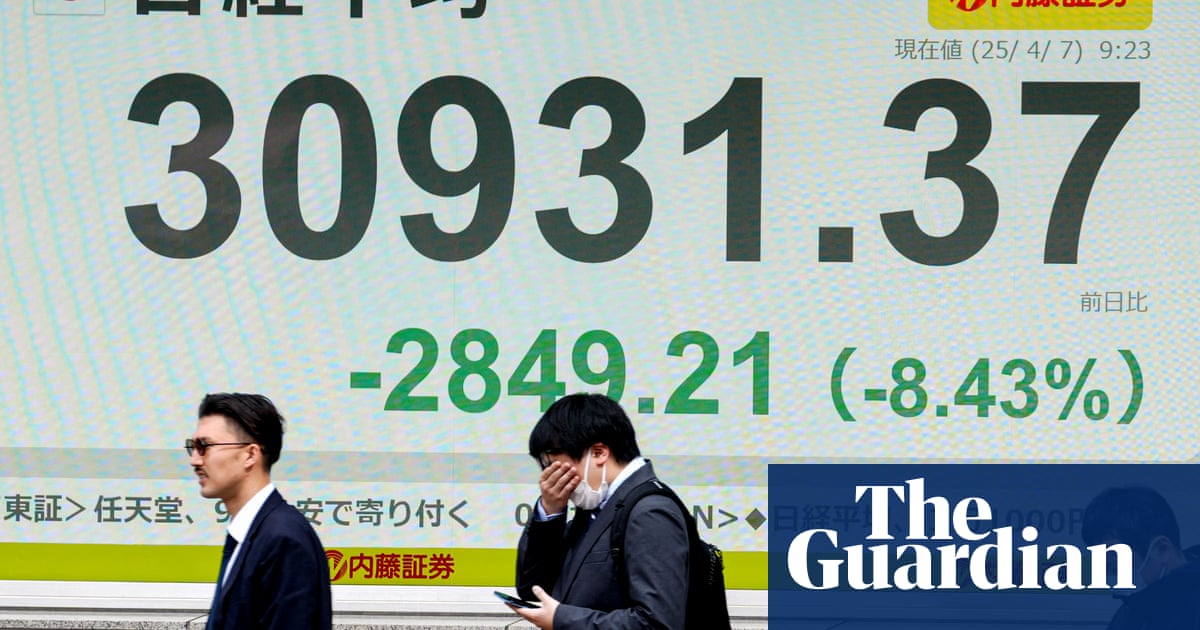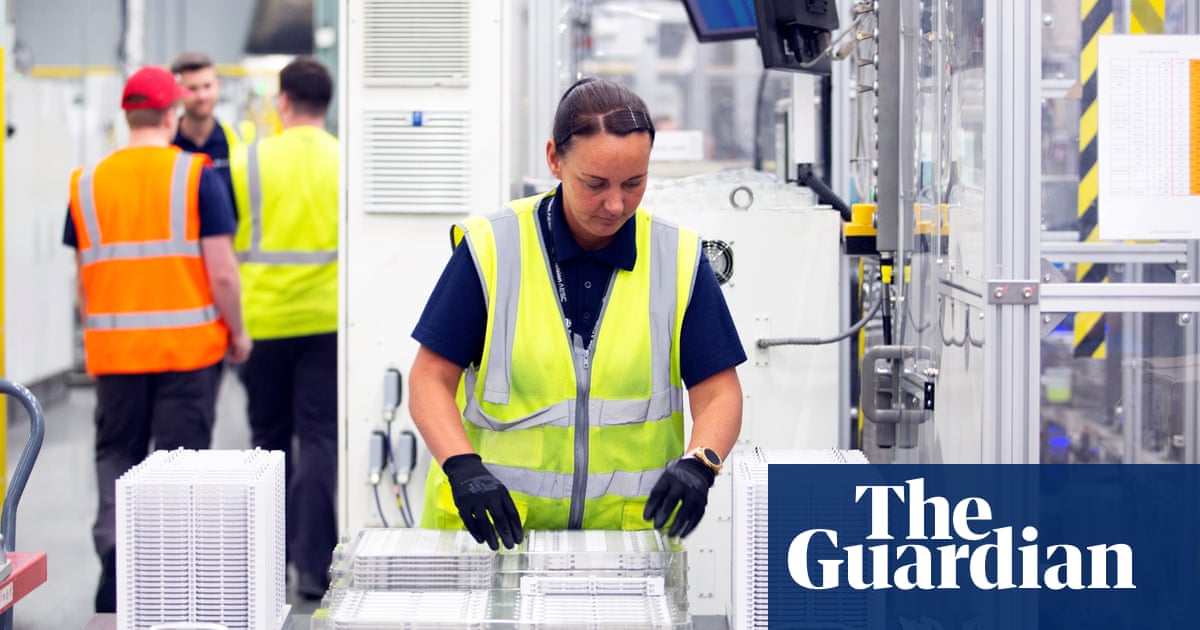Good morning. The markets might have been closed over the weekend, but the break has offered little respite for those who might have hoped for some sign that Donald Trump would consider a change to his tariffs policy.
With White House officials and the president himself insisting that their plan was the right one despite the global economic meltdown it has induced, the market sell-off in response continued in earnest this morning in Asia – and traders in Europe and the US will be braced for more of the same later today.
The sharp market decline is not an abstract set of numbers – but a key indicator of how analysts see the impact of a new trade war playing out in the global economy. For the very latest, head to the business live blog. Today’s newsletter explains what’s happened this morning, and why it matters. Here are the headlines.
Five big stories
-
War crimes | A war crimes complaint against 10 Britons who served with the Israeli military in Gaza is to be submitted to the Met police by one of the UK’s leading human rights lawyers. Michael Mansfield KC is one of a group of lawyers behind a dossier alleging targeted killing of civilians and aid workers.
-
France | The French far-right leader Marine Le Pen has told supporters in Paris she would fight “a political, not a judicial ruling” that could bar her from the next presidential election, as a rival rally denounced an “existential threat” to the rule of law after her conviction for embezzling public funds.
-
UK politics | Labour and the Tories have become embroiled in a war of words after the Conservative leader, Kemi Badenoch, defended Israel’s decision to deny two MPs entry into the country and deport them. MPs from across parliament criticised Badenoch for her response to Israel’s decision to expel the Labour MPs Yuan Yang and Abtisam Mohamed.
-
Deaths in custody | More than 100 relatives of people who have died after contact with the police in the UK since 1971 have joined plans for a class action lawsuit in pursuit of compensation and justice. Organisers had recorded 3,000 deaths involving the police in the UK over the past 50 years, during which time four police officers have been convicted over a killing.
-
Olivier awards | The play Giant, which portrays children’s author Roald Dahl amid an outcry about his antisemitism, has triumphed at the Olivier awards on a star-studded night at the Royal Albert Hall in London. Among three awards for the production, US star John Lithgow took home the best actor prize for his performance as Dahl.
In depth: ‘A global recession is on the cards and coming on fast’
The early news from Asian markets is of a stock market rout. In Japan, the Nikkei index fell 6.5%, recovering slightly from an initial fall of nearly 9%. The main stock indices in Hong Kong and Taiwan, where markets were closed on Friday for a public holiday, both fell almost 10%. Stocks in Singapore fell 8%, and the Australian market dropped more than 6%. And in South Korea, the market dropped more than 5%, with trading briefly halted to mitigate the volatility.
All of those falls were attributed to the impact of Donald Trump’s tariffs, with many Asian countries thought to be particularly vulnerable to the crisis because of their close relationships with both China and the US.
Stocks in banks were among the worst affected, as they were last week, in a key barometer of the mood: banks make fewer loans in tough economic times, and see more customers default on the loans they’ve already made. Japan’s huge sell-off was led by the country’s three largest banks. And in early trading in Hong Kong on Monday, HSBC fell more than 15%, and Standard Chartered by 18%.
What does all this tell us about the impact of US tariffs?
That many traders agree with what Keir Starmer wrote in a column for the Sunday Telegraph: “The world as we knew it has gone”. The markets are responding to the mood of absolute uncertainty about what happens next – other than that there is little sign that the crisis will be over soon, and that its impact will be far-reaching.
Stephen Innes, head of trading and market strategy at SPI Asset Management, put it in blunt terms: “The market’s telling you in plain language: global demand is vanishing, and a global recession is on the cards and coming on fast.”
That gets at why what’s happening in the markets will ultimately matter for everyone, not just those with investment portfolios: stocks are a leading indicator for the health of the economy more generally. Companies that are in retreat are more likely to cut jobs and pull back on investments. Government tax revenues will also fall. And, as Hilary Osborne explained in this piece last week, anyone in a defined contribution pension scheme could see their retirement income affected (although that depends a lot on timing, and doesn’t mean that selling is the right thing to do).
Events in Asia may also presage further falls in Europe and the US. US futures, a way for investors to bet on prices before the markets open, were sharply down over the weekend, which may indicate more pain ahead later today.
Is there any sign of Trump changing course?
No – and that is a key reason for the further slump, analysts said. Bill Ackman, a billionaire fund manager and supporter of Trump, urged him to signal a “90-day time out” and that the alternative was “a self-induced, economic nuclear winter”. Robert Pavlik, a senior portfolio manager at Dakota Wealth, said that “people were looking for some kind of comment over the weekend from somebody in the administration that would indicate some possible negotiation or maybe a change in the tariffs. But they seemed to dig in their heels.”
That was a reflection of a series of interviews and statements in which White House officials took a sunnily optimistic view of the chaos in the markets. Peter Navarro, one of the architects of Trump’s plan, even told Fox News that “we are going to have the biggest boom in the stock market we’ve ever seen”. And he added: “you can’t lose money unless you sell”.
Treasury secretary Scott Bessent, meanwhile, told NBC’s Meet The Press that “there doesn’t have to be a recession” – and indicated that the policy would take a long time to play out. Trump himself doubled down, saying that now is a “great time to get rich”. On Sunday, he wrote in a social media post: “Some day people will realize that Tariffs, for the United States of America, are a very beautiful thing!”
How has the UK government responded?
With a promise of support for British industry. Keir Starmer spent the weekend making calls to world leaders including European Commission president Ursula von der Leyen, French president Emmanuel Macron, and incoming German chancellor Friedrich Merz.
Today, he will set out plans to give carmakers more flexibility over how they meet a target to stop sales of new petrol and diesel cars by 2030, with exemptions from smaller manufacturers. Plans to support other sectors are expected to be set out later this week, Pippa Crerar reported.
The UK continues to hope that it will be able to reach a trade deal, with reports of an offer to cut tariffs on imported American beef and fish. There has also been talk of reducing the digital services tax paid by big American tech firms. But there is no sign of an imminent deal. (This piece by Richard Partington sets out the case for retaliation and the case for negotiating with Trump.)
Yesterday, chief treasury secretary Darren Jones echoed Starmer’s column in a BBC interview, telling Laura Kuenssberg: “Globalisation as we’ve known it for the last couple of decades has come to an end”.
Are other countries seeking to negotiate?
The White House has claimed that more than 50 countries have sought to initiate trade talks. Taiwan, India Vietnam and Italy have all indicated their willingness to negotiate, while Israel’s Benjamin Netanyahu is expected in Washington DC today to hold talks over the tariffs as well as the war in Gaza.
But even if those talks end in some kind of deal, it is not clear that major economic players like the EU and China will be ready to make the kind of concessions that Trump is demanding – and that is likely to mean that the market turmoil continues for a long time, with the threat of global recession accompanying it. Scott Bessent said yesterday that he did not expect the crisis to be over soon, because other countries have been “bad actors for a long time”. He added: “It’s not the kind of thing you can negotiate away in days or weeks”.
after newsletter promotion
What else we’ve been reading
-
As a black man whose father died of prostate cancer, Steve McQueen (above) had a greater than one in two chance of getting it – and he did. In this interview with Simon Hattenstone for Saturday magazine, the film-maker talks about how his grief saved his life, and the “stupid information” that could save so many more. Archie
-
John Harris spoke with film-maker (and the grand-niece of Walt Disney), Abigail Disney, about her art, activism, building a progressive grassroots politics in the face of fascism. I most enjoyed her views on the billionaire class: “I am of the belief that every billionaire who can’t live on $999m is kind of a sociopath,” she says. Nimo
-
A concerted effort is under way to diminish the gravity of Israel’s daily assault on Gaza, writes Nesrine Malik – but “the evidence of the illegality and disproportionality of Israel’s campaign” continues to mount. Her column is a powerful assertion of the idea that in fact, “the opposite of fatigue” has set in. Archie
-
ICYMI: Michael Savage’s piece on Vladimir Putin’s regime designating BBC journalists in Russia foreign agents offers a powerful, moving look at those who continue to report fearlessly despite the threat of retribution. “Every single night, I dream about my home. And yet, I will likely never see it again until these repressive laws are repealed,” journalist Anastasia Lotareva said. Nimo
-
The Snow White controversy – a media company’s box office flop seemingly blamed on a 23-year-old actor speaking their mind – is tedious and overblown. But, like many overhyped scandals, it reveals something more sinister about the attitude of powerful cultural institutions to dissident voices, Jessica Winter writes in The New Yorker. Nimo
Sport
Football | Southampton’s relegation was confirmed with a 3-1 defeat at Tottenham, making them the first side to be demoted with seven Premier League games remaining in the season.
Football | Rodrigo Muniz starred for Fulham as they defeated Liverpool 3-2 – although the lead leaders maintained an 11-point gap at the top of the Premier League after Arsenal’s 1-1 draw at Everton on Saturday. The Manchester derby ended in a 0-0 draw at Old Trafford.
Formula One | Max Verstappen won from pole position in the Japanese Grand Prix, beating the McLarens of Lando Norris and Oscar Piastri into second and third by just over a second.
The front pages
Trump’s tariffs dominate headlines this morning as the Guardian leads with “Labour ‘will support key industries’ hit by tariffs”, the Metro splashes on “Musk’s Trump tariff revolt” on his calls for free trade with the EU, the FT runs with “Trump officials dismiss market rout in vow to press on with punishing tariffs”, and for the Times it’s “Green rules relaxed to protect UK car industry”. The Telegraph splashes on “Door-to-door NHS to tackle health crisis”, while the Daily Mail leads with “Nine out of 10 GPs call for NHS prostate screening programme”. The Daily Mirror has “Summer of discontent: Brit tourists face waves protests” on anti-tourism protests in Spain and the Daily Express splashes on “Victory for Express campaign as No 10 agrees to fund veterans’ travel”.
Today in Focus
The surprising crisis in British television – podcast
About 70% of TV freelancers are believed to be out of work – can the industry bounce back? Michael Savage reports
Cartoon of the day | Edith Pritchett
Sign up for Inside Saturday to see more of Edith Pritchett’s cartoons, the best Saturday magazine journalism and an exclusive look behind the scenes
The Upside
A bit of good news to remind you that the world’s not all bad
In a rundown hangar in Kathmandu, the rusting remains of old electric trolley buses are a reminder of a bold experiment, launched 50 years ago, to electrify the city’s public transport system. Today, that vision is being revived with real momentum. More than 70% of four-wheeled vehicles imported into Nepal last year were electric, showing a stunning rise in EV adoption. With nearly all of Nepal’s power coming from clean hydropower, the switch is making a real difference, particularly in Kathmandu, one of the world’s most polluted cities. For many, like bus driver Krishna Chaulagain, electric vehicles mean cleaner air and cheaper travel. Tax breaks, lower running costs and better financing have made EVs more accessible and appealing, even becoming a status symbol. Though there are still challenges, especially with electrifying buses and building charging infrastructure, progress is under way.
Maheshwar Dhakal, the head of the government’s climate-change management division, says even more needs to be done. “The growth in EVs in Nepal is remarkable,” he says. “But if we become carbon neutral tomorrow, it doesn’t make sense at a global scale. The international community must follow our lead.”
Sign up here for a weekly roundup of The Upside, sent to you every Sunday
Bored at work?
And finally, the Guardian’s puzzles are here to keep you entertained throughout the day. Until tomorrow.










